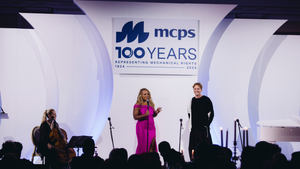The UK music publishing sector gathered in London yesterday to celebrate the 100th anniversary of the Mechanical Copyright Protection Society, or MCPS to its friends.
Current chair, Universal Music Publishing’s Jackie Alway, revealed she had delved into the mechanical rights collecting society’s archives when preparing her speech for the event.
While we might think of format shifts as a relatively modern challenge, Alway highlighted the constant changes in how the mechanical rights in songs make money for songwriters and music publishers over the hundred years MCPS has been around, as music moved from wax cylinders to shellac-based discs, from vinyl to cassette to CD and back to vinyl, from downloads to streaming to TikTok.
However, Alway said, “I was struck by the similarities between the MCPS of yesterday and the MCPS of today”. When MCPS was founded in 1924 by the merger of two earlier earlier licensing companies, the organisation’s mission was threefold, “to help songwriters and composers make money legitimately; to prevent money being made from music illegitimately; and to lobby for improved copyright legislation to keep up with the technology aimed at evading it”.
“A century later, this three-pronged purpose remains central to MCPS’s mission”, she added. “More simply put, we are here to protect the value of the song and return the maximum value possible to those who create it”.
As well as running through the various new technologies that have totally changed the mechanical rights business over the decades, Alway also talked about changes at MCPS itself. That included its acquisition by the Music Publishers Association in 1976, its alliance with performing rights society PRS in 1997, and the 2013 restructure that put in place the current business model, in which PRS became a service provider to MCPS.
She then finished her speech by returning to the fundamentals of the society’s mission statement: standing up for copyright. “Amongst all the jargon, court cases and negotiations”, she declared, “it is easy to lose sight of the real power of copyright: to get people paid for the art they create. It is the principle that sustains the cultural ecosystem, protecting music from Bowie to Winehouse, and Marley to McCartney”.
“Our robust copyright framework here in the UK is the foundation on which so much of our wonderful country’s global renown and success is built”, she continued. “For instance, we remain one of only three net exporters of music around the world. It will only stay that way if we protect the rights of those who create music and make sure they are paid. This is a non-negotiable, and it is MCPS’s most fundamental mission”.
Noting the latest technology to impact on music rights, she concluded, “As we adapt to the presence of AI in our industry, we will do all we can to empower human creativity over coding. It is our job at MCPS to ensure the real people who invest their time, talent and money into creating music are fairly paid. These efforts are as important now as they ever have been. MCPS has been so valuable over its first 100 years, but we cannot rest on our laurels”.

